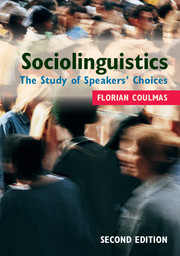Book contents
- Frontmatter
- Contents
- List of figures
- List of tables
- Preface to the second edition
- 1 Introduction: notions of language
- Part I Micro-choices
- Part II Macro-choices
- 7 Code-switching: linguistic choices across language boundaries
- 8 Diglossia and bilingualism: functional restrictions on language choice
- 9 Language spread, shift and maintenance: how groups choose their language
- 10 Language and identity: individual, social, national
- 11 Language planning: communication demands, public choice, utility
- 12 Select letters: a major divide
- 13 The language of choice
- 14 Research ethics
- Glossary of terms
- References
- Index
- References
9 - Language spread, shift and maintenance: how groups choose their language
Published online by Cambridge University Press: 05 August 2013
- Frontmatter
- Contents
- List of figures
- List of tables
- Preface to the second edition
- 1 Introduction: notions of language
- Part I Micro-choices
- Part II Macro-choices
- 7 Code-switching: linguistic choices across language boundaries
- 8 Diglossia and bilingualism: functional restrictions on language choice
- 9 Language spread, shift and maintenance: how groups choose their language
- 10 Language and identity: individual, social, national
- 11 Language planning: communication demands, public choice, utility
- 12 Select letters: a major divide
- 13 The language of choice
- 14 Research ethics
- Glossary of terms
- References
- Index
- References
Summary
Languages, like organic species can be classified into groups and subgroups… Dominant languages and dialects spread and lead to the gradual extinction of other tongues.
Charles Darwin, The Descent of Man and Selection in Relation to SexThe lure of English has not left us. And until it goes, our own languages will remain paupers.
Mohandas Gandhi (1965)Outline of the chapter
Some societies are characterized by relatively stable language arrangements; others are more volatile. This chapter addresses the questions of how and why language choices by individuals and groups bring about incremental change of sociolinguistic arrangements in language-contact settings. By way of conceptualizing the inequality of the world’s languages, it provides a brief review of their distribution and offers a five-tiered scheme as a general orientation. It then goes on to consider language-demographic statistics, explaining the difficulties of obtaining reliable data. The concepts of language loyalty, ethnolinguistic vitality, territories and domains, and utility are introduced as the most promising theoretical tools for analysing unstable language arrangements. By way of illustration, reference is made to the spread of languages on the Internet and to the ascent of English to the status of global language.
- Type
- Chapter
- Information
- SociolinguisticsThe Study of Speakers' Choices, pp. 163 - 188Publisher: Cambridge University PressPrint publication year: 2013



